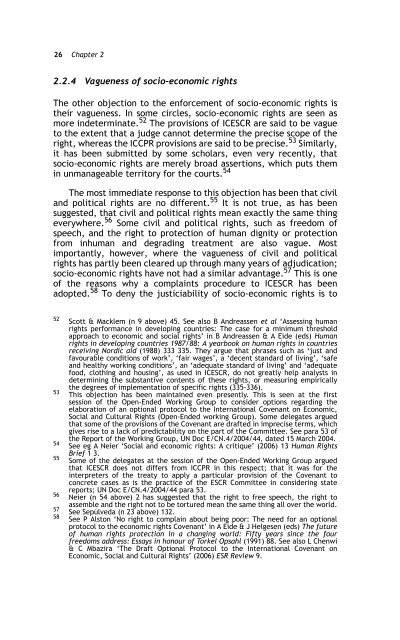LITIGATING SOCIO-ECONOMIC RIGHTS IN SOUTH AFRICA - PULP
LITIGATING SOCIO-ECONOMIC RIGHTS IN SOUTH AFRICA - PULP
LITIGATING SOCIO-ECONOMIC RIGHTS IN SOUTH AFRICA - PULP
You also want an ePaper? Increase the reach of your titles
YUMPU automatically turns print PDFs into web optimized ePapers that Google loves.
26 Chapter 2<br />
2.2.4 Vagueness of socio-economic rights<br />
The other objection to the enforcement of socio-economic rights is<br />
their vagueness. In some circles, socio-economic rights are seen as<br />
more indeterminate. 52 The provisions of ICESCR are said to be vague<br />
to the extent that a judge cannot determine the precise scope of the<br />
right, whereas the ICCPR provisions are said to be precise. 53 Similarly,<br />
it has been submitted by some scholars, even very recently, that<br />
socio-economic rights are merely broad assertions, which puts them<br />
in unmanageable territory for the courts. 54<br />
The most immediate response to this objection has been that civil<br />
and political rights are no different. 55 It is not true, as has been<br />
suggested, that civil and political rights mean exactly the same thing<br />
everywhere. 56 Some civil and political rights, such as freedom of<br />
speech, and the right to protection of human dignity or protection<br />
from inhuman and degrading treatment are also vague. Most<br />
importantly, however, where the vagueness of civil and political<br />
rights has partly been cleared up through many years of adjudication;<br />
socio-economic rights have not had a similar advantage. 57 This is one<br />
of the reasons why a complaints procedure to ICESCR has been<br />
adopted. 58 To deny the justiciability of socio-economic rights is to<br />
52 Scott & Macklem (n 9 above) 45. See also B Andreassen et al ‘Assessing human<br />
rights performance in developing countries: The case for a minimum threshold<br />
approach to economic and social rights’ in B Andreassen & A Eide (eds) Human<br />
rights in developing countries 1987/88: A yearbook on human rights in countries<br />
receiving Nordic aid (1988) 333 335. They argue that phrases such as ‘just and<br />
favourable conditions of work’, ‘fair wages’, a ‘decent standard of living’, ‘safe<br />
and healthy working conditions’, an ‘adequate standard of living’ and ‘adequate<br />
food, clothing and housing’, as used in ICESCR, do not greatly help analysts in<br />
determining the substantive contents of these rights, or measuring empirically<br />
the degrees of implementation of specific rights (335-336).<br />
53<br />
This objection has been maintained even presently. This is seen at the first<br />
session of the Open-Ended Working Group to consider options regarding the<br />
elaboration of an optional protocol to the International Covenant on Economic,<br />
Social and Cultural Rights (Open-Ended working Group). Some delegates argued<br />
that some of the provisions of the Covenant are drafted in imprecise terms, which<br />
gives rise to a lack of predictability on the part of the Committee. See para 53 of<br />
the Report of the Working Group, UN Doc E/CN.4/2004/44, dated 15 March 2004.<br />
54 See eg A Neier ‘Social and economic rights: A critique’ (2006) 13 Human Rights<br />
Brief 1 3.<br />
55<br />
Some of the delegates at the session of the Open-Ended Working Group argued<br />
that ICESCR does not differs from ICCPR in this respect; that it was for the<br />
interpreters of the treaty to apply a particular provision of the Covenant to<br />
concrete cases as is the practice of the ESCR Committee in considering state<br />
reports; UN Doc E/CN.4/2004/44 para 53.<br />
56 Neier (n 54 above) 2 has suggested that the right to free speech, the right to<br />
assemble and the right not to be tortured mean the same thing all over the world.<br />
57 See Sepúlveda (n 23 above) 132.<br />
58 See P Alston ‘No right to complain about being poor: The need for an optional<br />
protocol to the economic rights Covenant’ in A Eide & J Helgesen (eds) The future<br />
of human rights protection in a changing world: Fifty years since the four<br />
freedoms address: Essays in honour of Torkel Opsahl (1991) 88. See also L Chenwi<br />
& C Mbazira ‘The Draft Optional Protocol to the International Covenant on<br />
Economic, Social and Cultural Rights’ (2006) ESR Review 9.
















